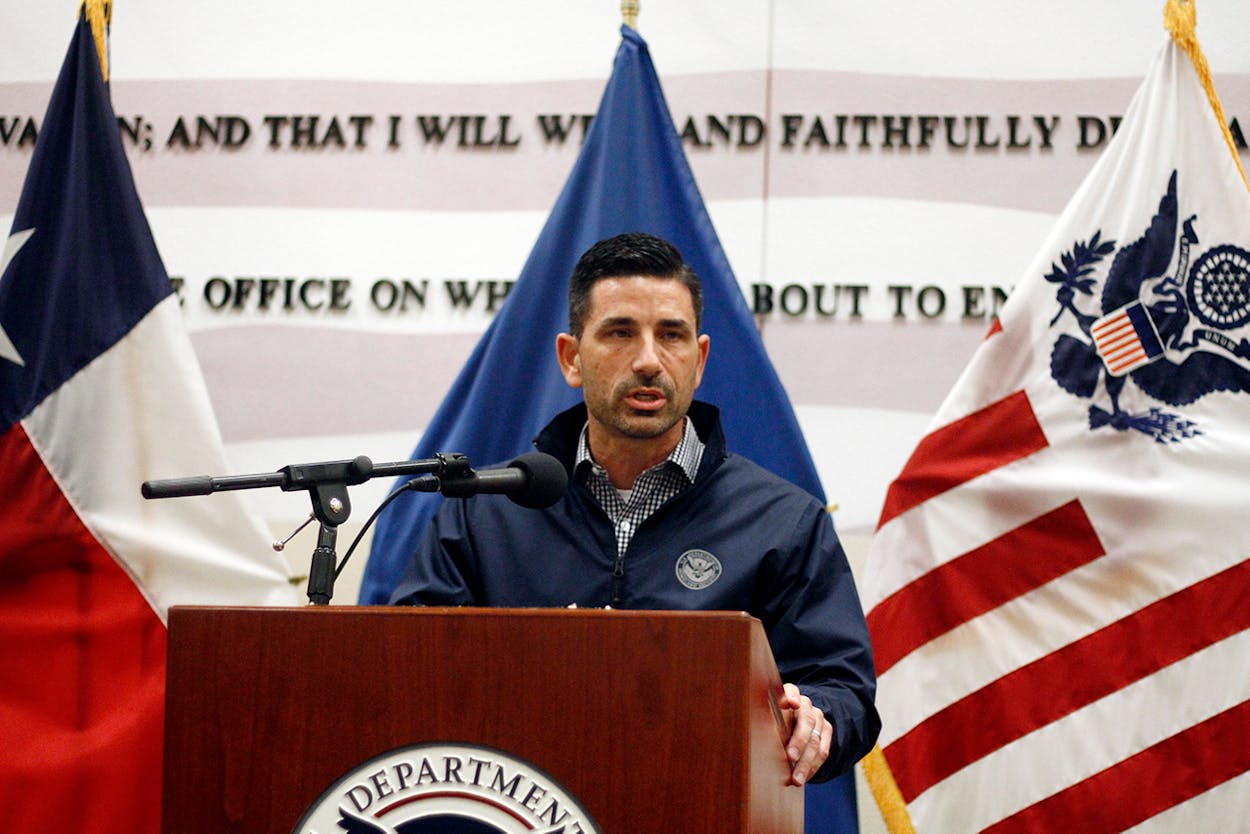Last Thursday, Chad Wolf, the new acting secretary of the Department of Homeland Security, came to South Texas to inspect 64 feet of newly constructed border wall, the first of what the Trump administration promises will be dozens of miles of wall built in the region in the next year. Though the photo op grabbed all the media attention, Wolf also quietly convened a meeting earlier that day with twenty businessmen from the Rio Grande Valley to hear their concerns about trade and other border issues impacting business.
The cordial meeting, which took place in a McAllen Embassy Suites conference room, represented the first time any of President Trump’s five Homeland Security secretaries had met with businesspeople from the Valley. For participants in the meeting, which included representatives from the import industry, customs brokering, transportation, and banking, it signaled that at least one part of the Trump administration may take cross-border trade into account instead of maintaining a single-minded focus on border security.
Wolf, a native of Plano who worked for senators Phil Gramm and Kay Bailey Hutchison, may be more attuned to the economy and politics of Texas than his predecessors. “When the secretary started, he did say, ‘I’m going to be going out to check on the progress of the wall here. Some of you may not be fans of it, but it’s a high priority of the president’s. But I’m here to talk about your priorities,’” said one person at the meeting who asked not to be identified because he was not authorized to speak.
Attendees were told to assume that Congress would approve the United States-Mexico-Canada trade deal (USMCA), which is currently caught in a standoff between House Speaker Nancy Pelosi and Trump. What would they need to handle anticipated growth in trade under the new agreement? Over a meal of chicken cordon bleu, the businesspeople said that customs agents, agricultural inspectors, and even the port-of-entry infrastructure itself were already struggling to keep up with cross-border activity. Because of new trade routes in Mexico, for example, the Pharr International Bridge has been the number one importer of Mexican produce to the United States for the past three years.
Wolf was given a copy of an April report by Waco-based economist Ray Perryman that showed how even slight disruptions to U.S.-Mexico commerce can be painful. The report estimated that border slowdowns, such as the soaring wait times this spring when the Border Patrol redeployed customs agents to process families seeking asylum, may cost the U.S. economy as much as $69 billion over three months. In South Texas, two-hour waits suddenly became two-day waits, Dante Galeazzi, president and CEO of the Texas International Produce Association, told Wolf.
“We told him about the challenges at the various ports, whether it’s about trucks crossing, staffing issues, needing additional resources, expanding infrastructure, or all the various challenges that we’ve encountered,” said Galeazzi, noting that his industry has grown 142 percent in the Valley in the last ten years, yet federal funding to support that trade has grown by only 20 percent.
Most of the challenges impact the speed at which $1.7 billion in products cross the U.S.-Mexico border on a daily basis. The issues, he said, were “not just in the last year . . . We’re talking about issues that have been ongoing, they’re systemic. People were talking about issues from twenty years ago.”
One concern brought up at the meeting with Wolf was a recent agreement between the U.S. and Mexico that means the U.S. will inspect the majority of Mexican tomatoes coming in. Participants at the meeting said there was already a shortage of agriculture inspectors and that inspections would only worsen the wait times for a perishable commodity.
But it was a story about humble strawberries that seemed to leave the biggest impression with Wolf, said one witness. Guillermo Rodriguez Ochoa, CEO of Guimajo USA, which imports the fruit, told Wolf the federal government’s cold storage units where agricultural inspectors examine fruit were kept at 45 degrees. Strawberries, he said, need to be stored at 33 degrees. That difference in temperature diminishes the shelf life of strawberries by as much as 20 percent, a loss that is built into his business model. But because of a shortage of agricultural workers, the strawberries are idling for longer, causing them to lose sweetness and dry out.
Participants described the conversation as cordial and promising, but Trump’s draconian border and immigration policies—central to his reelection campaign—overshadow a single, one-hour meeting.
Just thirteen months earlier, Trump shocked his senior staff as a caravan of Central Americans headed to the United States by tweeting that he was prepared to seal the southern border if Mexico didn’t stop the migrants. Senior staff had repeatedly warned him that the economic disruption would be massive, but Trump didn’t seem to care. In short, when it comes to the border, Trump is fixated on his border wall in part, he says, to protect against Mexican drug cartels even though Customs and Border Protection statistics show that most of the flow of illicit drugs comes through ports of entry.
But Wolf left the meeting telling the businessmen, “I see this as the beginning of a conversation. If you are ever in Washington, please look up my staff. And if you come as a group, I would like to see you again.”
- More About:
- Politics & Policy
- Business
- Border Wall
- Rio Grande Valley






